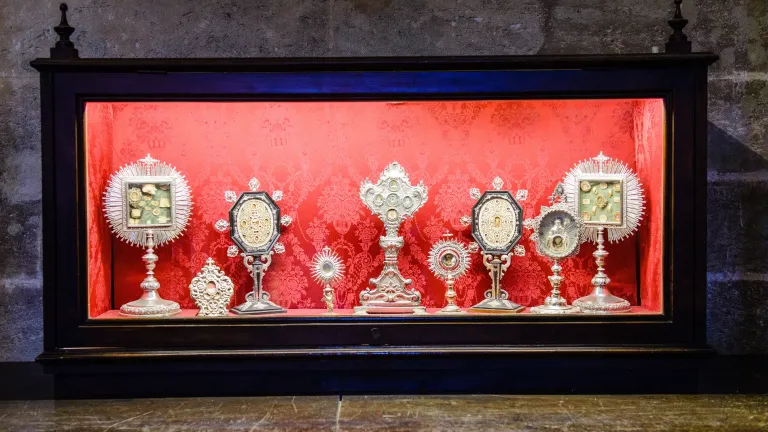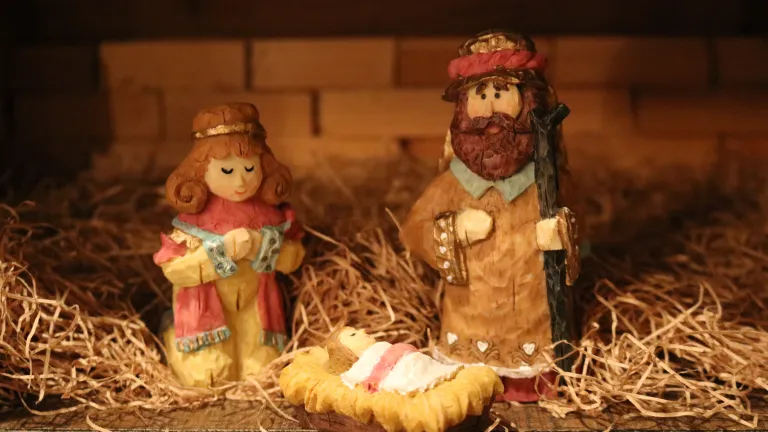What Is the Deal With Relics and Saints? Where Did They Come From, and Should Christians Worship Them?

Every form of idolatry seeks to make God small enough to be manageable and usable according to man’s imagination. But God cannot be reduced to serve us or to fit into our own designs.
Many people around the world make long pilgrimages to see relics of supposed spiritual significance to their particular religious beliefs. The practice predates Christianity.
Catholic.org explains, “The word relics ... [refers to] some object, notably part of the body or clothes, remaining as a memorial of a departed saint. The veneration of relics, in fact, is to some extent a primitive instinct, and it is associated with many other religious systems besides that of Christianity.”
The Catholic church keeps charge of their designated relics and you may find among them a wide variety of items that came from a so-called “saint” including a preserved head, a tongue, a finger, a garment, wood fragments and much more.
Whether or not these items are proven to have come from a particular source is not the concern as far as Scripture is concerned.
The concerns are these:
1. God did not instruct us to use any relics in our worship
The Second Commandment is clear: “You shall not make for yourself a carved image—any likeness of anything that is in heaven above, or that is in the earth beneath, or that is in the water under the earth; you shall not bow down to them nor serve them” (Exodus 20:4-5).
The prophet Isaiah spoke of the foolishness of idols: “Those who make an image, all of them are useless, and their precious things shall not profit; they are their own witnesses; they neither see nor know, that they may be ashamed. Who would form a god or mold an image; that profits him nothing?” (Isaiah 44:9-10). “He cuts down cedars for himself, and takes the cypress and the oak; he secures it for himself among the trees of the forest. He plants a pine, and the rain nourishes it. Then it shall be for a man to burn, for he will take some of it and warm himself; yes, he kindles it and bakes bread; indeed he makes a god and worships it; he makes it a carved image, and falls down to it” (Isaiah 44:14-15).
2. Saints do not intercede between us and God
Acts 17:16-34 records that the apostle Paul condemned the notion of praying to anyone other than God. In ancient Athens, Paul came across many of the so-called gods to pray to depending on the particular need. There were altars to Zeus (the king god), and his daughter Athena (the goddess of wisdom). Along with these were the so-called gods of the bountiful harvest (Demeter) and Aphrodite (the goddess of love and beauty) to choose from.
In response to the Athenians' search for God many centuries ago, Paul’s message was clear: your prayer to these non-gods is worthless.
Likewise, if the apostle Paul were to walk the streets today, he would not approve of the practice of many who pray to deceased saints. For example, praying to St. Anthony to help find things which are lost. Or Saint Jude if you are experiencing any type of financial hardship. These are just a few examples of the misplaced worship of any created being which violates God’s instructions and commandments.
On that day in Athens, Paul began to preach the truth of “the resurrection of the dead.” And while some mocked him, others were willing to hear this truth” (Acts 17:32).
The fact is, all those who have died, will not be conscious again until the time of their resurrection after Jesus Christ returns to earth. The patriarch Job writes: “Man dies and is laid away; indeed he breathes his last and where is he? As water disappears from the sea, and a river becomes parched and dries up, so man lies down and does not rise. Till the heavens are no more, they will not awake nor be roused from their sleep” (Job 14:10-12). To learn more regarding the resurrections, read our study guide “What Happens After Death?”
3. We are not to add or take away from the biblical instruction to worship God alone
The words of the prophet Isaiah must have rang in Paul’s ears, “I am the LORD, that is My name; and My glory I will not give to another, nor My praise to carved images” (Isaiah 42:8).
Paul knew that God told His people to get rid of all of those idols and to serve the only true and living God. He knew that the prophets made clear that the making of gods or idols was not the way to know or honor the Creator, and it was an abomination to God.
If you’re a believer today, you might ask God to open up your eyes in a new way regarding any idols that may be in your life. Discover more regarding this biblical truth through our video "Hard Questions: Are Christians Guilty of Idolatry?" In it, Gary Petty asks the question, "Could you be practicing idolatry without realizing it?"




